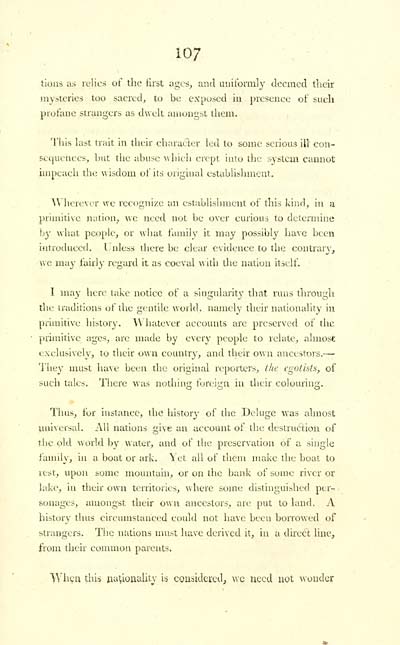Blair Collection > Celtic researches, on the origin, traditions & language, of the ancient Britons
(197)
Download files
Complete book:
Individual page:
Thumbnail gallery: Grid view | List view

107
tions as relics of the Erst agcSj and uniformly deemed tlieir
mysteries too sacred, to be exposed in presence of such
profane strangers as dwelt amongst them.
I'liis last trait in their eharaeier led to some serious ill oon-
secjuenecs, bat the abuse Mliieh crept into the system cannot
impeach the wisdom of its original establishment.
Wherever we recogni/.e an establishment of this kind, in a
primitive nation^ we need nut be over curious to determine
b}• what people, or what lamily it may possibly have been
introduced. I nless there be clear evidence to the contrary-,
we may fairly regard it as coeval with the nation itself.
I may here take notice of a singularity that runs through
the traditions of the gentile world, namely their nationality in
primitive history. Whatever accounts are preserved of the
j)rimitive ages, are made by every people to relate, almost
exclusively, to their own country, and their own ancestors. —
1'hey must have been the original reporters, the egotists, of
such talcs. There Avas nothing foreign in their colouring.
Thus, for instance, the history of the Deluge Avas almost
universal. All nations give an account of the destruction of
the old world by water, and of the preservation of a single
fannly, in a boat or ark. Vet all of them make the boat to
lest, upon some mountain, or on the bank of sume river or
lake, in their own territories, where some distinguibhed per-
sonages, amongst their own ancestors, are put to land, A
history thus circumstanced could not have been borrowed of
strangers. The nations uiust have derived it, in a direct line,
from their common parents.
Wiiçn this iiationahty is considered, wc need not wonder
tions as relics of the Erst agcSj and uniformly deemed tlieir
mysteries too sacred, to be exposed in presence of such
profane strangers as dwelt amongst them.
I'liis last trait in their eharaeier led to some serious ill oon-
secjuenecs, bat the abuse Mliieh crept into the system cannot
impeach the wisdom of its original establishment.
Wherever we recogni/.e an establishment of this kind, in a
primitive nation^ we need nut be over curious to determine
b}• what people, or what lamily it may possibly have been
introduced. I nless there be clear evidence to the contrary-,
we may fairly regard it as coeval with the nation itself.
I may here take notice of a singularity that runs through
the traditions of the gentile world, namely their nationality in
primitive history. Whatever accounts are preserved of the
j)rimitive ages, are made by every people to relate, almost
exclusively, to their own country, and their own ancestors. —
1'hey must have been the original reporters, the egotists, of
such talcs. There Avas nothing foreign in their colouring.
Thus, for instance, the history of the Deluge Avas almost
universal. All nations give an account of the destruction of
the old world by water, and of the preservation of a single
fannly, in a boat or ark. Vet all of them make the boat to
lest, upon some mountain, or on the bank of sume river or
lake, in their own territories, where some distinguibhed per-
sonages, amongst their own ancestors, are put to land, A
history thus circumstanced could not have been borrowed of
strangers. The nations uiust have derived it, in a direct line,
from their common parents.
Wiiçn this iiationahty is considered, wc need not wonder
Set display mode to: Large image | Transcription
Images and transcriptions on this page, including medium image downloads, may be used under the Creative Commons Attribution 4.0 International Licence unless otherwise stated. ![]()
| Early Gaelic Book Collections > Blair Collection > Celtic researches, on the origin, traditions & language, of the ancient Britons > (197) |
|---|
| Permanent URL | https://digital.nls.uk/75766049 |
|---|
| Description | A selection of books from a collection of more than 500 titles, mostly on religious and literary topics. Also includes some material dealing with other Celtic languages and societies. Collection created towards the end of the 19th century by Lady Evelyn Stewart Murray. |
|---|
| Description | Selected items from five 'Special and Named Printed Collections'. Includes books in Gaelic and other Celtic languages, works about the Gaels, their languages, literature, culture and history. |
|---|

